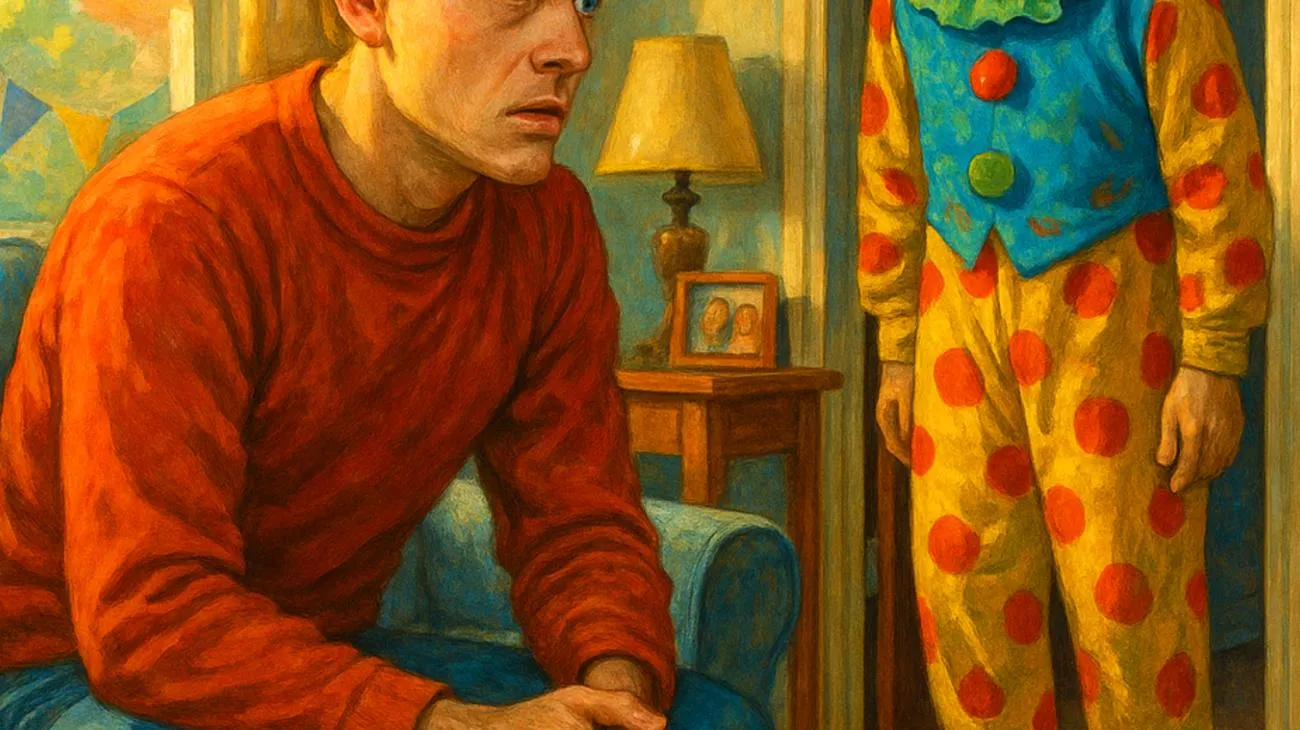Let’s be real for a hot second: if you’ve ever felt your stomach drop at the sight of a clown, you’re definitely not alone, and you’re definitely not crazy. Coulrophobia – yes, that’s the official fancy name for clown fear – affects anywhere from 1.5% to a mind-blowing 53.5% of adults worldwide. That red nose and painted smile might be designed to bring joy, but for a surprising number of people, clowns trigger the same fight-or-flight response you’d get from spotting a spider in your morning coffee.
Here’s the plot twist that’ll blow your mind: your clown fear is actually proof that your brain is working exactly like it should. We’re not talking about some random psychological glitch – we’re talking about your mind’s sophisticated security system doing its job so well it deserves a raise. Recent groundbreaking research has finally cracked the code on why so many of us get the creeps from these supposedly cheerful entertainers, and the answer is way more fascinating than you’d expect.
The Numbers Will Shock You
First things first – you need to know just how not-alone you are in this. That’s potentially more than half the planet feeling sketchy about red noses and oversized shoes! And here’s what makes this even more interesting: this fear crosses all cultural boundaries. Whether you’re in Dubai, New York, or Tokyo, clowns seem to trigger the same uncomfortable feelings in people everywhere.
There’s something universal about our reaction to these painted performers, and it’s not some rare, exotic condition. Researchers have been diving deep into figuring out what makes our brains hit the panic button when Bobo shows up at the birthday party.
Your Brain Is Playing Detective (And Clowns Are Messing With the Evidence)
A massive 2023 study involving 528 people who admitted to fearing clowns finally gave us the scientific breakdown of what’s really happening in our heads. The researchers created something called the Origins of Fear of Clowns Questionnaire, and what they discovered was absolutely brilliant.
Here’s the deal: your brain is constantly running background checks on every person you meet. It’s like having a built-in security system that’s been fine-tuned over thousands of years of human evolution. This system relies heavily on reading facial expressions, body language, and behavioral patterns to determine whether someone is safe, trustworthy, or potentially dangerous.
But clowns? They’ve basically thrown a wrench into this entire system. That thick white makeup, those exaggerated features, and those painted-on expressions create what scientists call “hidden emotional signals.” Your brain is desperately trying to run its usual safety scan, but it keeps getting error messages.
Think of it like this: try having a serious conversation with someone wearing a mask that’s stuck in a permanent grin. You have no idea if they’re actually happy, plotting something, or secretly judging your outfit. That uncertainty? That’s your brain’s alarm system going off.
The Unpredictability Problem
As if the emotional confusion wasn’t enough, clowns are professionally unpredictable. They might honk a horn, squirt water from a flower, start juggling, or suddenly burst into an impromptu dance. While this randomness is supposed to be entertaining, your brain’s threat-detection system is having a complete meltdown.
Our minds are prediction machines. We’re constantly trying to anticipate what’s going to happen next because it helps us stay safe and feel in control. When someone’s behavior is deliberately chaotic and impossible to predict, it triggers a deep sense of unease that goes way beyond just feeling uncomfortable.
It’s the same reason why most people would feel anxious if a coworker suddenly started acting completely randomly at the office – speaking in weird voices, making sudden movements, and refusing to show their real emotions. Your brain would be working overtime trying to figure out what’s wrong and whether you need to be concerned.
Welcome to the Uncanny Valley (Population: Every Clown Ever)
Here’s where psychology gets really wild. There’s this concept called the Uncanny Valley Effect that perfectly explains why certain things give us the absolute creeps. Originally discovered by researchers studying robotics, it describes that spine-tingling feeling we get when something looks almost human but not quite right.
Clowns are like the poster children for this effect. They’re obviously human beings, but the makeup, costumes, and exaggerated features make them appear like distorted versions of people. Your brain recognizes that it’s looking at a human, but something fundamental feels wrong about the whole package.
This is the same psychological mechanism that makes some people uncomfortable around certain dolls, masks, or even very realistic robots. Our brains have incredibly sophisticated face-recognition software, and when those familiar human features are altered just enough to seem unnatural, it sets off internal alarm bells.
Hollywood Made Everything Worse
Let’s be honest – popular culture has absolutely demolished clowns’ reputation. From Stephen King’s terrifying “It” to countless horror movies featuring murderous entertainers, media has basically turned these performers into nightmare fuel. The research confirms that negative media portrayals play a huge role in developing and maintaining clown fear.
But here’s what’s really interesting: the study found that personal traumatic experiences with actual clowns weren’t a major factor for most people who fear them. It’s not like everyone who’s afraid of clowns had some terrible childhood birthday party incident. Instead, it’s these deeper psychological mechanisms – the emotional ambiguity, the unpredictability, and yes, all those scary movies – that create and maintain the fear.
What Your Clown Fear Reveals About Your Mental Superpowers
If you’re someone who gets nervous around clowns, here’s what you need to know: your brain is actually functioning at an incredibly sophisticated level. Your fear response is evidence of some pretty impressive mental abilities that most people take for granted.
- Advanced Threat Detection: Your mind can spot potential dangers, even subtle or unusual ones that others might miss
- Superior Social Intelligence: You depend heavily on reading genuine facial expressions and body language, which means you’re probably great at detecting authenticity in real relationships
- Excellent Pattern Recognition: Your brain works hard to understand and predict behavior patterns, making you good at anticipating problems before they happen
- Strong Self-Preservation Instincts: You have robust survival mechanisms that prioritize your safety over social expectations
Your sensitivity to clowns might actually reveal something important about how you navigate life. People who are particularly bothered by the emotional confusion that clowns create often tend to be individuals who value clear communication, appreciate genuine authenticity in their relationships, and feel uncomfortable in situations where people’s true intentions are unclear.
When Fear Becomes a Real Problem
Now, while having some discomfort around clowns is totally normal and even adaptive, sometimes this fear can become intense enough to significantly impact your daily life. Coulrophobia falls under the category of specific phobias in psychological classifications, which means it can be a legitimate anxiety disorder requiring professional attention.
If your clown fear causes panic attacks, makes you avoid places where you might encounter clowns, or significantly interferes with your social functioning, it might be worth talking to a mental health professional. The good news is that specific phobias respond very well to treatment, particularly cognitive behavioral therapy and gradual exposure therapy.
But for most people, clown fear is just a quirky part of having a highly functioning threat-detection system. It’s your brain being protective, not problematic.
Embracing Your Brain’s Protective Instincts
The next time someone tries to make you feel weird about your clown fear, you can confidently tell them that your reaction is based on solid psychological science. You’re not being irrational or childish – you’re demonstrating that your brain has some seriously impressive protective mechanisms.
Your mind’s ability to detect emotional ambiguity, spot unpredictable behavior, and feel uncomfortable with distorted human features shows that your psychological radar is operating at a very high level. These are the same mental processes that help you build meaningful relationships, navigate complex social situations, and avoid potentially problematic people or scenarios in your everyday life.
So wear your clown fear like a badge of honor. It’s proof that your brain takes your safety seriously and has developed some pretty sophisticated ways to keep you protected. In a world full of people and situations that aren’t always what they seem, having a mind that immediately flags potential red flags isn’t just useful – it’s actually pretty amazing.
And honestly? If avoiding clowns means you skip a few awkward birthday parties or steer clear of certain fast-food mascots, that seems like a pretty small price to pay for having such an effective internal security system, don’t you think?
Table of Contents

